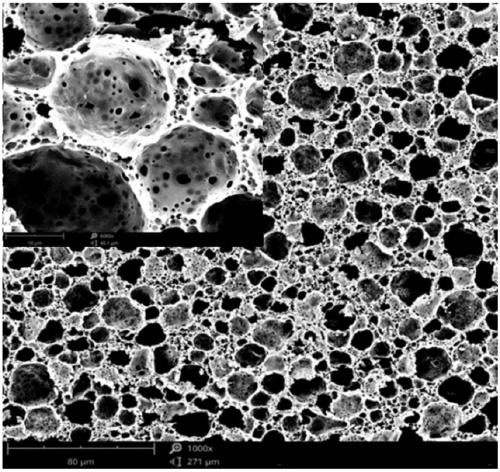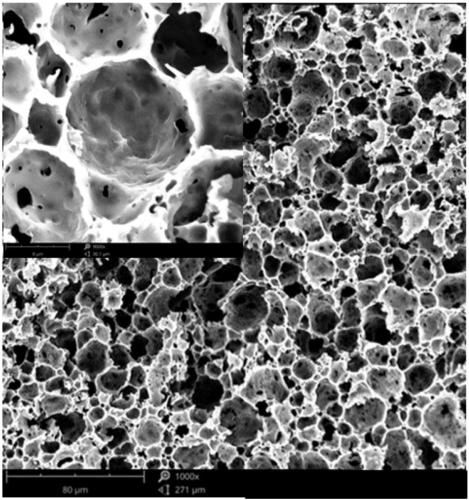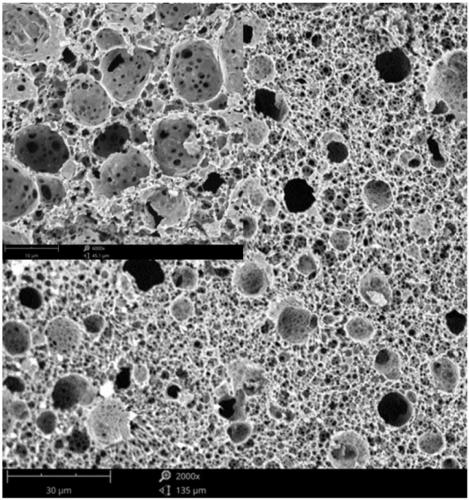Pressure-sensitive polymer syntactic foam with hierarchical cellular structure and preparation method thereof
A composite foam and multi-stage pore technology, which is applied to the measurement of the property and force of piezoelectric resistance materials, etc., can solve the problem of immature pressure-sensitive polymer foam technology with high sensitivity and hierarchical pore structure, and the lack of control of foam hierarchical pore structure, etc. problems, to achieve the effects of wide stress response range, high response sensitivity, and high increment
- Summary
- Abstract
- Description
- Claims
- Application Information
AI Technical Summary
Problems solved by technology
Method used
Image
Examples
Embodiment 1
[0051] 1. Preparation of oil phase:
[0052] (1) 0.7 g of methyl methacrylate, 0.4 g of butyl acrylate, 0.3 g of propyl acrylate, 5.67 g of isooctyl methacrylate and 0.81 g of divinylbenzene are mixed uniformly to obtain a mixed monomer.
[0053] (2) Add 3.5 g of Span 80 and 0.03 g of azobisisobutyronitrile to the mixed monomer obtained in (1), and mix them uniformly to obtain an oil phase.
[0054] 2. Preparation of the water phase
[0055] Add 20 grams of graphene oxide aqueous dispersion (the concentration of the graphene oxide aqueous dispersion is 5 mg / g, and the graphene oxide sheet size is 20 μm), 0.2 grams of ascorbic acid and 0.21 grams of sodium chloride, added to 30 mL of deionized water Get the water phase. During this period, an ultrasonic method can be used to assist the uniform dispersion of graphene oxide; finally, sodium hydroxide (1M) solution is added dropwise to the filtrate to adjust the pH to 7 for use.
[0056] 3. Preparation of pressure sensitive foam
[0057] F...
Embodiment 2
[0060] 1. Preparation of oil phase:
[0061] (1) 0.66 g of styrene, 0.68 g of butyl acrylate, 6.88 g of isooctyl methacrylate and 0.9 g of ethylene glycol dimethacrylate are mixed uniformly to obtain a mixed monomer.
[0062] (2) Add 1 g of Hypermer A70 and 0.06 g of azobisisobutyronitrile to the mixed monomer obtained in (1), and mix them uniformly to obtain an oil phase.
[0063] 2. Preparation of the water phase
[0064] Add 20 grams of graphene oxide aqueous dispersion (the concentration of graphene oxide aqueous dispersion is 5 mg / g, and the graphene oxide sheet size is 100 μm), 0.25 grams of ascorbic acid and 0.3 grams of anhydrous calcium chloride, added to 50 mL of deionization Prepare the water phase in water. During this period, an ultrasonic method can be used to assist the uniform dispersion of graphene oxide; finally, sodium hydroxide (1M) solution is added dropwise to the filtrate to adjust the pH to 6 for use.
[0065] 3. Preparation of pressure sensitive foam
[0066] F...
Embodiment 3
[0069] 1. Preparation of oil phase:
[0070] (1) 0.4 g of styrene, 0.68 g of butyl acrylate, 7.23 g of isooctyl methacrylate, and 0.9 g of divinylbenzene are mixed uniformly to obtain a mixed monomer.
[0071] (2) Add 1.8 g of Hypermer A70 and 0.08 g of benzoyl peroxide to the mixed monomer obtained in (1) and mix uniformly to obtain an oil phase.
[0072] 2. Preparation of the water phase
[0073] Add 20 grams of graphene oxide aqueous dispersion (concentration of graphene oxide aqueous dispersion is 1mg / g, graphene oxide sheet size is 2-10μm), 0.3g ascorbic acid, 0.2g potassium nitrate, and 0.1g sodium nitrate are added to Prepare the water phase in 55 mL of deionized water. During this period, an ultrasonic method can be used to assist the uniform dispersion of graphene oxide; finally, sodium hydroxide (1M) solution is added dropwise to the filtrate to adjust the pH to 8 for use.
[0074] 3. Preparation of pressure sensitive foam
[0075] First, pour the oil phase into a three-neck ...
PUM
| Property | Measurement | Unit |
|---|---|---|
| size | aaaaa | aaaaa |
| pore size | aaaaa | aaaaa |
| pore size | aaaaa | aaaaa |
Abstract
Description
Claims
Application Information
 Login to View More
Login to View More - R&D
- Intellectual Property
- Life Sciences
- Materials
- Tech Scout
- Unparalleled Data Quality
- Higher Quality Content
- 60% Fewer Hallucinations
Browse by: Latest US Patents, China's latest patents, Technical Efficacy Thesaurus, Application Domain, Technology Topic, Popular Technical Reports.
© 2025 PatSnap. All rights reserved.Legal|Privacy policy|Modern Slavery Act Transparency Statement|Sitemap|About US| Contact US: help@patsnap.com



